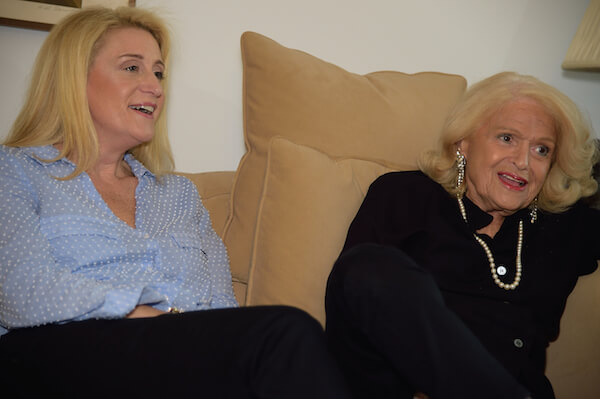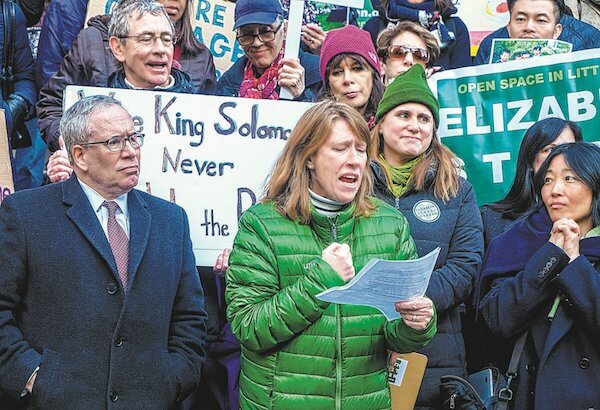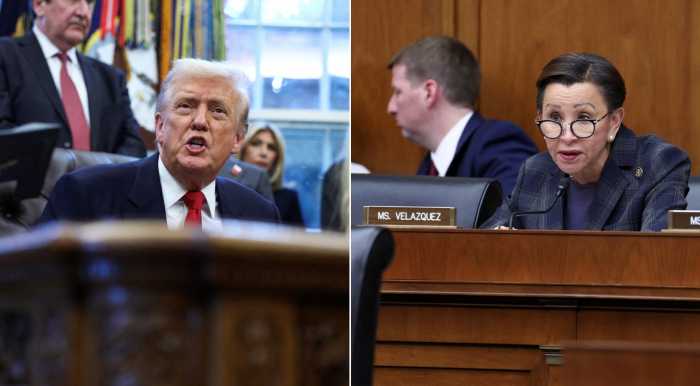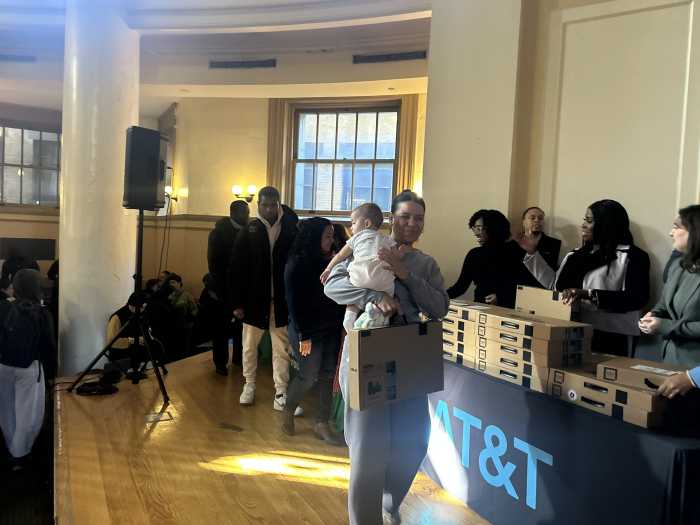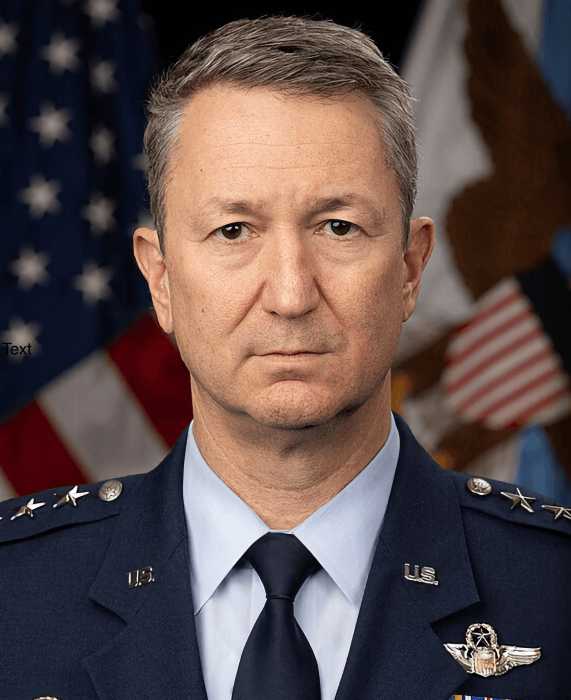Edie Windsor (right) with her new spouse, Judith Kasen. | DONNA ACETO
BY PAUL SCHINDLER | “I lived with a spectacular woman for 40 years, and now I live with another one. It didn’t occur to me that I would find another person in my life. It didn’t occur to me that I would have another such love in my life.”
That was Edie Windsor last week, talking about something “wonderful” she “never imagined” would happen, as she sat in the living room of the Lower Fifth Avenue apartment she shares with her new spouse, Judith Kasen.
The couple married on September 26 in a City Hall ceremony that caught nearly everyone close to them off guard — at least for its timing. Their friends, Kasen explained, were not at all surprised the women decided to tie the knot — “because they knew it was coming.”
The other spectacular woman, with whom Windsor had earlier spent 40 years, was Thea Spyer. It was Spyer’s marriage to Windsor in Toronto in 2007 and her death two years later that in short order would bring Windsor to the world’s attention — as well as enduring iconic status in the LGBT community.
Windsor and Spyer were 30-something New Yorkers when they began dating in 1965. They got engaged two years later, but as for marriage, at the time they “never thought it would happen,” Windsor said. Then, almost exactly 40 years after their engagement, Canada legalizing same-sex marriage finally enabled the couple to wed.
Less than two years later, Spyer who had long suffered from progressive multiple sclerosis and more recently a heart condition, passed away. It was the federal government’s discriminatory $360,000-plus estate tax levy against longtime marriage equality activist Windsor that thrust her onto a much larger stage as a pioneering and victorious advocate.
With her attorney, Roberta Kaplan, Windsor, in 2010, filed suit against the Defense of Marriage Act. Though she was not the first plaintiff to prevail against DOMA, she did win at both the district court and before the Second Circuit Court of Appeals in 2012. It was the Republican House of Representatives’ appeal of her appellate victory that the Supreme Court chose to hear and it was her challenge that, in June 2013, effectively gutted the 1996 law, finding the ban on federal recognition of legal same-sex marriages unconstitutional.
Though the high court at that time made clear it was not deciding the underlying question of a constitutional right to marriage by same-sex couples, the ruling was cited over and over again by federal courts in a blizzard of pro-equality rulings that quickly brought the issue back to the Supreme Court for its final resolution in June 2015.
City Clerk Michael McSweeney greets Edie Windsor and Judith Kasen at the Marriage Bureau on September 26. | DANIELLE REDA
When Windsor decided to mount a federal case against DOMA, she was no stranger to activism. In addition to years of working alongside the community’s earliest marriage advocates, she was, by 2010, already the recipient of a Lifetime Achievement Award from SAGE, Services and Advocacy for GLBT Elders, and had long been involved as well with the LGBT Community Center and the Callen-Lorde Community Health Center.
Still, in the wake of her DOMA win — which unleashed a euphoric LGBT response from coast to coast — Windsor’s vigor at the age of 84 in using her new-found fame to advance the community’s agenda was nothing short of astonishing. Whether it was the Center’s annual Women’s Event, a roll-out of a national senior housing initiative by SAGE, a rally for homeless LGBT youth in Union Square, or innumerable other gatherings, she seemed to be everywhere.
“Because of my name, because I am Edie Windsor, I have a certain amount of pull,” she said last week. “And I feel an obligation when somebody asks me to please come speak or even to put my name on their ad — ‘Yes, yes, and I promise I’ll be there.’”
Seeing a vibrant woman in her mid 80s always engaged, always smiling, and — yes — always looking great in photos, it can be hard to imagine the other side of the coin — the loss of Thea at her side.
Recalling the years between Spyer’s death and meeting Kasen — years we all recall as being full of Edie Windsor — she said her life was “very full with the community, but that’s not the same. And when Judith came into my life, I had just admitted to my best friend, ‘You know, I’m really lonely.’”
Judith Kasen kisses Edie Windor's cheek at September 18 AIDS Ride welcoming home party at the LGBT Community Center – barely a week before their wedding at City Hall. | DONNA ACETO
During those same years, Kasen was taking note of Windsor, with even greater avidity than the countless other LGBT fans drawn to her after her high court win.
“My first recollection of Edie Windsor was when she got the SAGE Lifetime Achievement Award in 2010,” said Kasen, a 51-year-old vice president with Wells Fargo Advisors. “My crush started then, way before she became Edie Windsor.”
To be sure, Kasen flirted, but her recounting of that suggests she employed a light touch, perhaps conscious of not embarrassing either Windsor or herself.
“One of these days, Edie Windsor, you are going to go out with me,” Kasen said at one event last year, to which Windsor replied, “Stop teasing me.”
Asked last week whether she really thought she was being put on, Windsor, without skipping a beat, replied, “Yeah, of course!”
But Kasen was serious and kept at it, even at the cost of a bit of sting.
“It was the Center Women’s Dinner,” she recalled of an event last November, “and I saw her at the cocktail hour, and as then as they were walking out — this is a rough story for me — as they were walking out, whoever it was walking her out, I said to Edie, you know, ‘Go out with me, Edie Windsor,’ and whoever was walking her out turned to me and added, ‘You know, you’re not her type,’ and I was like, ‘Ouch!’”
At that anecdote, the couple shared a hearty laugh, then Kasen added, “We can’t figure out who it is” that tried to warn her off.
Whatever wound her pride suffered didn’t last long. Within weeks, Kasen would walk Windsor home to Fifth Avenue from the Center’s holiday party on West 13th Street.
Judith Kasen and Edie Windsor at the Lower Fifth Avenue home. | DONNA ACETO
“And we talked for, like, hours,” Kasen recalled. “We sat and talked for hours, and then in the hallway, by her door, she kissed me. Then I called her during the week, and she asked me to go to Robbie [Kaplan’s] Hanukkah party that following Friday.”
Picking up the story, Windsor said, “And very quickly, very quickly, it really caught quick, it really caught. We began dating seriously, almost right away.”
Windsor recalled that Spyer, likely mindful of the old joke that lesbians tend to rent a U-Haul for their second date, always said “all seasons twice” — two years — give a couple “a chance to know if, in fact, it’s for real.” Windsor was ready to be patient, though she did enough reconnaissance to establish that Kasen “always wanted to get married but there had never been the right person.”
Events, however, outran Windsor’s patience.
“I got sick during the summer and was afraid I was dying, and I asked if she wanted to get married,” she said. “Her quote — what was your quote?”
“Any time, any place, anywhere,” Kasen shot back immediately. “That was my response.”
“And I said I think we should do it right away,” Windsor continued. “My sense was that if I’m going to die on her, it would be unfair — we were clearly in love, we were practically living together, and that I shouldn’t cheat her” by leaving her unmarried.
“I think that that’s what started it, but then we were both intrigued by the idea,” Windsor added. “Once we decided to do it, we were out of our minds. We were like little kids.”
And so, with Kasen’s best friend, Danielle Reda, visiting from France, the couple traveled to Manhattan’s Marriage Bureau on Worth Street on a late September Monday to pledge their vows. When their officiant, Angel Lopez, learned from Kasen who the other bride was, he briefly excused himself, saying, “Let me get my boss,” City Clerk Michael McSweeney.
Now that Windsor is, in Margo Channing’s famous formulation from “All About Eve,” once again “a four-square, upright, downright, forthright married lady,” will she take the chance to ease back from her activism to enjoy some quiet domestic bliss?
“Not at all!,” was her instantaneous reply.
In fact, Kasen is introducing Windsor to advocacy groups she’d never before had an affiliation with. Though Windsor in recent years had pitched in with the Ali Forney Center and other groups serving homeless LGBT youth, she was unfamiliar with the Hetrick-Martin Institute, where Kasen has long been active. After Kasen made the introductions, however, Windsor was soon collaborating with HMI’s chief operating officer, Darra Gordon, in planning a gathering of a wide range of LGBT youth advocacy groups focused on different aspects of the issue.
“It was a wonderful conference,” Kasen said.
Asked whether she’s ever overwhelmed by the attention showered on Windsor when they’re at a public event together, Kasen replied, “I don’t think about it as being a celebrity spouse. She is just Edie to me.”
And Windsor was equally quick to dismiss that concern.
“First of all, she’s got a lot of personhood,” she said. “What’s the word I use?”
“Gravitas?,” Kasen offered.
“Yes, gravitas,” Windsor said. “So she’s perfect for me. She’s very much her own person, and she’s very much my person.”
Then, after a moment, she added, “She’s more sweetly social than I am so I had to teach her, when we’re leaving you hold your head straight forward, we don’t look right or left. We don’t want to know that somebody wants to take more pictures, because I’ve already done 90 pictures.”
Which led around to the question about how Windsor herself sustains her energy in the face of so much public attention.
Referring to her activism, especially over the past several years, she responded, “If I had to survive Thea, okay, and didn’t know I was going to meet Judith, I can’t think of a better way to live. It’s all joy and love.”
Then, focusing on all she’s gotten out of her public engagement, Windsor recalled a recent speech, after which “everybody kept thanking me. And I said, ‘Thank you.’ I’m somebody who was really a dumb, ignorant middle class woman, who said, ‘I’m not in trouble about being gay but I do have trouble identifying with those queens,’ and then a queen overturned that police car and changed my life. Okay, so that was the beginning of my sense of unity. And then during the AIDS crisis, when the lesbians poured in to help, what had then been a split really between the males and the females was deeply changed and my sense of community grew. And then when people were pouring into, looking to get into the Supreme Court, that made it even wider, that meant that we were out more — and the more of us that got out the more of us got out. It was suddenly wonderful not to be left behind in the closest. And it keeps happening. But it also happens with the straight world. Mothers discovered that their kids were gay. Everybody discovered that their neighbor was, that their friend was. And a lot of the stigma for us disappeared.”
And then, Edie Windsor got to the very heart of what her activism has meant to her: “So I’m grateful to live in this great world.”

